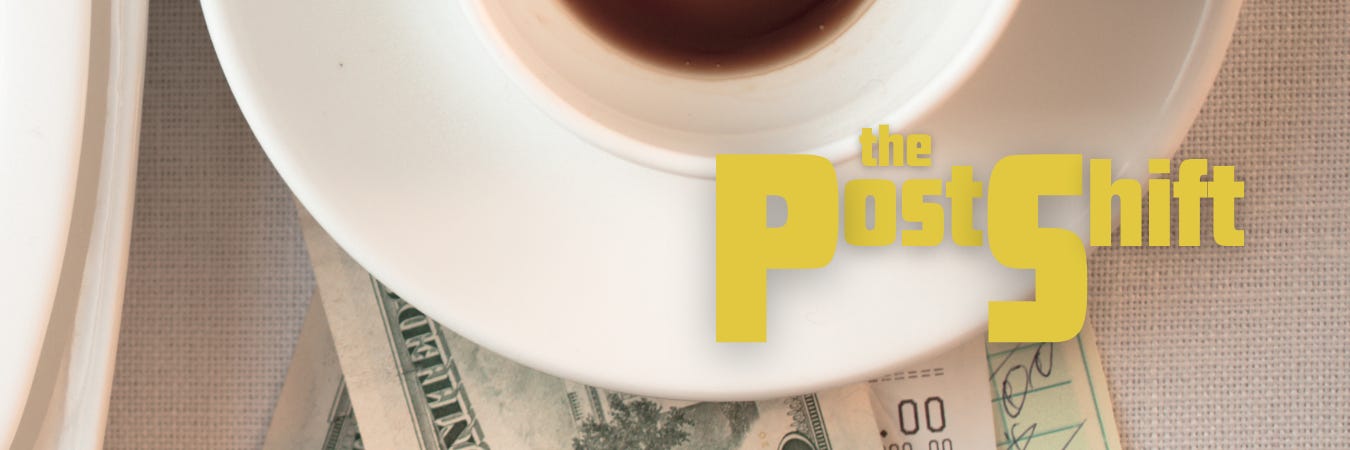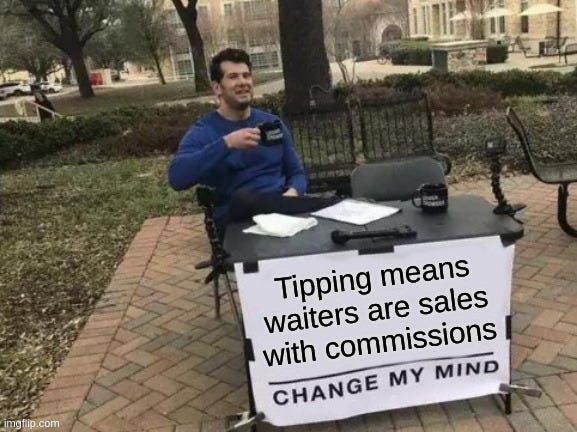Hi guys!
Before I get into it, if you are in the NYC area, here’s a coincidentally perfectly timed ranked list of the best free table bread in the city. (Although they do list Red Lobster, which feels rather obvious.)
I especially like to fill up on bread in this economy. Take someone on a date or treat yourself — if the bread’s free, maybe you’ll have a little extra left over for tipping.
Speaking of which… onto the letter!
Do you tip?
I actually want to know. I’ve learned over time that the most generous tippers (which these days, feels like anyone who tips at all) either currently work in the service industry, or have in the past.
I understand, to some extent, if you don’t. Especially post-pandemic, good service simply feels harder to find. Self-serve kiosks are more prevalent than ever before, and I guess I can kind of concede to Pete Well’s point on that front.
If I place my own coffee order with a robot, who gets that dollar tip? If you think I’m making this scenario up, visit Jarvis, the barista robot in the Muji store at Hudson Yards — there is most certainly a tip screen, as I witnessed myself recently. (The tips apparently go to the robot’s human handlers, who refill milk and replace parts.)
How did we get here?
Tipping is supposed to be a way of rewarding good service. Literally, “To Insure Prompt Service.”
Tipping originated in 17th-century England, where it was a practice among the aristocracy to offer money to servants for good service. The custom spread to the United States after the Civil War, where it was initially resisted but became entrenched as employers saw it as a way to underpay workers, especially in service roles like restaurants and railroads.
By the early 20th century, tipping had become widespread in the U.S., cementing a system that allowed businesses to pay lower wages while relying on customers to supplement workers’ income. These days, it has become an expectation that no longer feels optional or incentivized.
In restaurants, where servers are paid well below minimum wage in anticipation of tips, it’s practically a survival mechanism. But in other service industries, like delivery or coffee shops, where workers might receive higher base pay, tipping has started to blur the lines between what’s fair and what’s exploitative. That tablet screen at the counter? It’s almost coercive, silently pressuring people to add a few dollars to every transaction, regardless of the service provided.
This system, which on paper is meant to empower customers to directly reward good service, has evolved into something much more complex.
Workers end up reliant on the generosity or guilt of strangers, while employers get away with underpaying their staff. And those who rely on tips often find themselves stuck in a cycle where they can’t predict their income, making financial security tricky.
Aside —
If you’re navigating the roller coaster of tipped income, check out these resources that might help!
Podcast: How To Manage Inconsistent Income with Barbara Sloan
There’s also the issue of who gets tips. In traditional settings, like restaurants, it’s clear who the tip is for, but now, as tipping spreads to more casual, counter-service environments, it can certainly feel less justified.
You’re left wondering: should I tip for someone simply handing me my food at the counter? What about those in back-of-house roles who are rarely tipped, despite being integral to the service?
As it currently stands, tipping feels like a Band-Aid for a broken wage system. Rather than addressing the real issue—ensuring that workers are paid a livable wage—society has embraced a practice that places responsibility on the customer, turning the act of tipping into a daily moral dilemma.
This isn’t the first time the call to end tipping culture has been sounded. Major industry leaders have even gone so far as to actually make the shift. Back in 2015, Danny Meyer announced that he would eliminate tipping across Union Square Hospitality Group.
“…to narrow the stark income disparity between servers, who received tips, and cooks, who did not.
“I hate those Saturday nights where the whole dining room is high-fiving because they just set a record, and they’re counting their shekels, and the kitchen just says, ‘Well, boy, did we sweat tonight,’ Meyer said at the time.”
The piece continues:
Until, it seemed, the wheels came off. Most of the restaurants that participated in the Meyer-catalyzed no-tipping movement had, by 2018, returned to gratuity.
Meyer, whose organization never fully recovered from the shift to what he called “Hospitality Included,” capitulated earlier this summer, announcing that he would bring back tipping to USHG. Thus tipping won, and decisively.
Let’s talk (theoretical) solutions.
Despite the fact I have no personal power to change these systems, I’ve given tipping culture a fair amount of thought. As someone who has relied heavily on a tipped income for most of my industry career, it’s hard not to feel a direct, passionate, often emotionally tainted response to the idea.
What might be done? Or are we doomed, like Union Square Hospitality, to return to the crutch of tipping?
💛 What if we… raised the minimum wage for all workers, including tipped employees?
One of the most straightforward solutions would be the elimination of the sub-minimum wage (the idea that servers make $5/hour, for example, knowing that tips will compensate for the rest of their salary) and ensure everyone is paid an even, fair, livable base wage.
Workers would have more financial security knowing that tip variability is no longer in the equation. (Say goodbye to slow nights or milking the few tables you have in your section.) Employers would be responsible for paying workers what they deserve, taking the pressure to tip off of guests altogether.
The problem here, of course, is that restaurant models are notoriously precarious, with margins that are so slim they incentivize owners to lean on guest tips to pay workers. Staff size would likely shrink and menu prices would get higher.
Theoretically, over the long term, a higher minimum wage could phase out tipping as an ingrained social obligation and guests would get used to seeing higher prices that reflect the true cost of service.
💛 What if we… adopted a service charge model?
Another option would be to implement a mandatory service charge on all bills, similar to many European countries. Workers are compensated directly by the business for their labor, with customers still contributing to the cost but in a more structured, predictable way.
How would this work? Workers would receive consistent pay based on a percentage of sales, which could help standardize income. It would also eliminate the guessing game of how much to tip, giving customers clarity and taking away the awkwardness that comes with tipping.
The biggest hurdle here would be getting customers to adjust to a higher bill that includes a non-negotiable service charge. Some might view this as less personal than tipping, feeling like they’ve lost control over how they reward good service. And if service is poor, customers will resent paying a fee.
Theoretically, over the long term, a service charge could help normalize the idea that tipping is unnecessary, and guests would grow to expect higher service charges as part of the dining or service experience — the true cost of service.
💛 What if we… culturally shift toward no-tipping policies?
Some restaurants and businesses are already experimenting with a no-tipping policy, where tipping is either discouraged or banned entirely. Workers receive full wages, and tipping simply isn’t part of the equation.
The idea is to shift cultural expectations away from tipping entirely, creating a system where service is treated like any other profession, paid adequately and without reliance on gratuities.
Customers don’t have to worry about when and how much to tip. Workers would be paid higher wages, removing the dependence on fluctuating tips. Customers may enjoy a more relaxed experience, knowing they aren’t being judged for how much they tip.
Admittedly, businesses implementing a no-tipping policy might face resistance at first, especially from customers who enjoy the power dynamic of tipping. And some workers who are used to making significant money from tips might be reluctant to switch to a fixed wage system, especially if they work in high-end or high-volume establishments where tips can far exceed a regular paycheck.
This, to me, seems to be the best option. If enough businesses adopt no-tipping policies, I believe it could spark a wider cultural shift, and tipping can become an outdated thing of the past, right along with smoking sections. I’m in favor of a more equitable system where workers are fairly compensated and customers aren’t forced into the awkward, often judgmental tipping dance.
However, like I mentioned above, some hospitality giants have attempted this shift in the past, with poor results.
And in NYC? Restaurant owners just don’t want it, claiming ‘the change could lead to higher menu prices, staff layoffs — and could even threaten their businesses very existence.’
Yikes.
TL;DR
Tipping, once a token of appreciation, has morphed into a flawed system that places the burden of fair wages on the customer while leaving workers vulnerable to inconsistent income.
As we continue to grapple with this outdated practice, it's clear that change is overdue. Whether through raising the minimum wage, adopting service charges, or shifting away from tipping entirely, the goal should be to ensure workers are paid what they deserve—without leaving it to chance.
It’s time we rethink tipping culture and move toward a system that is fairer for everyone, where service workers are valued for their labor, not reliant on gratuities to make ends meet.
How? I’d love to hear your thoughts, theories, and models!
Have a great week! See ya Friday with the chisme.












I find that I always tip (in recent cases: bubble tea, haircut, uber eats), but at the same time, I rarely go out nor order in (following Sylvia Plaths' penny pinching ways) so it only seems natural to tip as it's part of the whole experience, which only comes so rarely. I do understand that those who do go out so often may not tip as much since it tallies up over time which could be a valid reason for tipping less or not at all. Thanks for sharing this discourse.